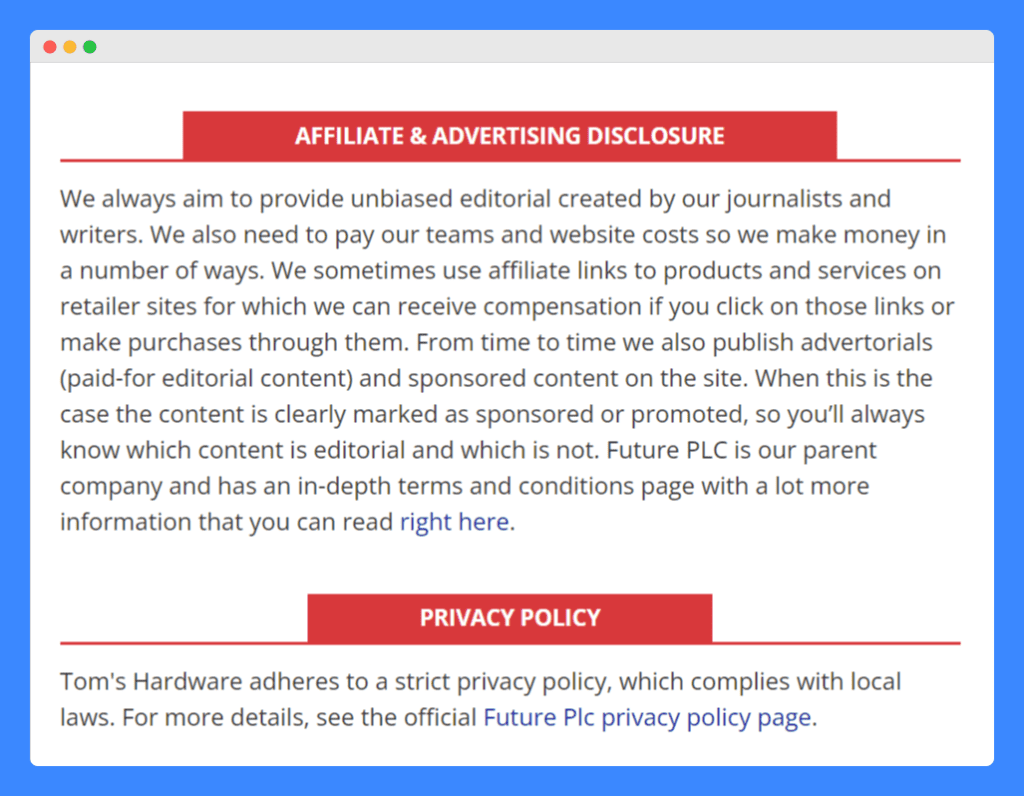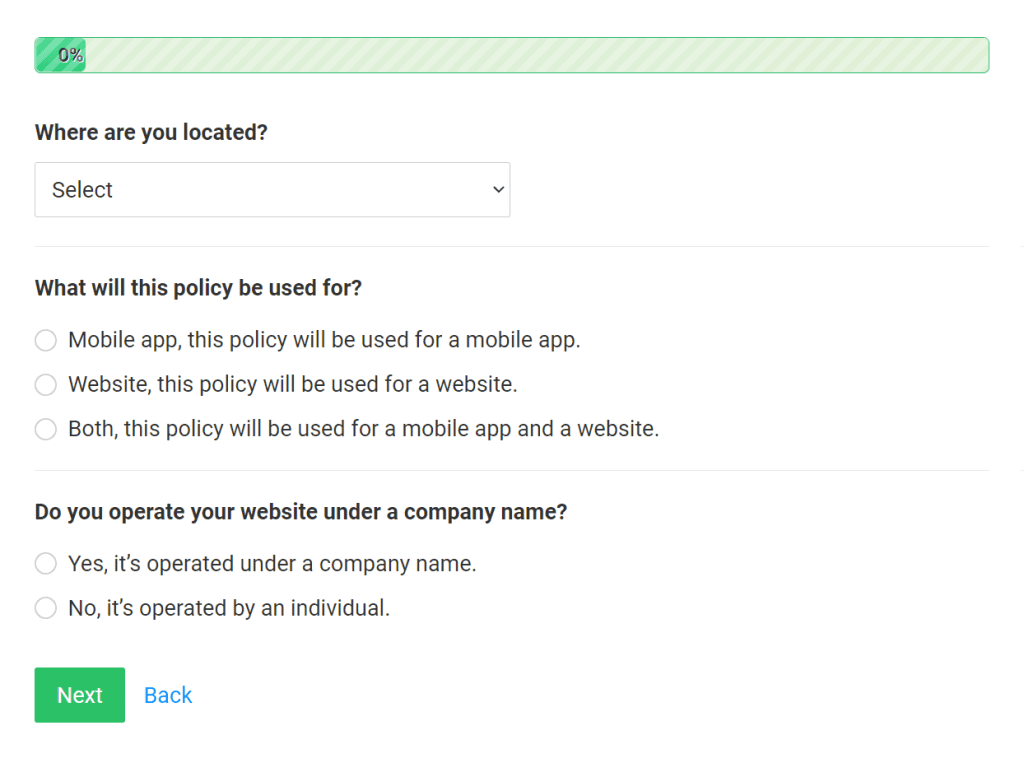If you’re into generating online income, then you already know that affiliate marketing can be an extremely lucrative opportunity.
Simply put, affiliate marketing is an arrangement where online retailers pay you a commission in exchange for referrals you provide. The more sales you generate, the more commission you earn.
But if you try to hide the fact that you’re being compensated, you could be violating the FTC’s rules regarding affiliate disclosures. You or the company you’re promoting may be subject to hefty fines if that’s the case.
But don’t stress. In this article, I’ll break down the basics for a correctly written FTC affiliate disclosure and provide some examples so you can rest assured you’re following all the rules.
Table of Contents
PRO TIP: Take the hassle of writing your own disclaimer away with our disclaimer generator trusted by over 200,000 businesses. It’ll save you hours of work and possible costly legal mistakes.
What is an FTC Affiliate Disclosure?
The concept is pretty simple. FTC affiliate disclosure is a statement that tells your audience that you’re being compensated for promoting certain products or services.
It’s very common to see it posted by bloggers, YouTube video creators, or on social media. Any time they receive some sort of compensation from the companies whose products or services they promote, they need to disclose it.
Compensation may vary and be in the form of:
- Affiliate commissions
- Discounts on products or services.
- Special access to products or events
- And more
What’s important is the disclosure needs to be a prominent feature of your content. You want to be upfront about the fact that you’re being compensated.
Don’t try to “bury it in the fine print.” That’s missing the point entirely and could easily be considered non-compliance.
In the FTC’s own words, affiliate disclosures must be clear and conspicuous.
“If you disclose your relationship to the retailer clearly and conspicuously on your site, readers can decide how much weight to give your endorsement.”
Although you might be tempted to hide your affiliate relationship so that buyers are more likely to trust your endorsement, this is precisely the sort of activity that the FTC’s guidelines intend to prohibit.
Compensation is broadly defined and isn’t limited to cash payments based on the number of sales or clicks you generate. Even if you’re just receiving free or discounted products or services, you still need an FTC affiliate disclosure.
Why Do You Need an FTC-Compliant Affiliate Disclosure?
The FTC’s stated mission is to protect the public from deceptive or unfair business practices.
The concept is easy to understand. Consider fake reviews, which are a very common example of deceptive affiliate marketing practices.
Let’s say you’re researching product reviews for a new pair of headphones. You come across a YouTube video that gives a glowing recommendation and a perfect 10 rating for a particular brand and model. Based on the review, you click the link and buy the headphones.
Wouldn’t you want to know if the manufacturer was paying the reviewer for every sale they generate?
If you’re being compensated to promote another company’s products or services, but the public doesn’t know about it, you’re conducting business in a deceptive and unfair way.
As a consumer, knowing that information will help you make an informed decision about how much weight to give the endorsement. Did the reviewer really believe these are the best headphones they’ve ever tested? Or were they just trying to get paid?
As an affiliate marketer, you’re deceiving your customers if you try to conceal your relationship with the company you’re promoting. Presenting your promotion as a completely unbiased and impartial review is a misrepresentation of the type of business you’re engaged in, and it’s exactly the sort of practice that the FTC’s rules are designed to prevent.
Let me assure you, even if you believe that your review is 100% honest in spite of the compensation you may receive, consumers still have a right to know that you have a financial incentive to say good things about what you’re promoting.
FTC Affiliate Disclosure Guidelines
While there are no exact guidelines from the FTC on how you should write your disclosure, there are certain requirements you must meet to be compliant.
1. Disclosures must be clear and conspicuous
Don’t try to use difficult-to-understand or tricky language when disclosing your relationship with the companies whose products or services you prompt. Be clear and upfront with your audience which will also help you create trust and transparency.
2. Display a disclosure before any affiliate links
Showing an affiliate disclosure at the bottom of the page just won’t cut it since people may click on your affiliate links before they even get to see the disclosure. So be sure to display it at the top of the page, ideally right on top of the content.
3. Links to disclosure are not sufficient
If your disclosure is displayed on a separate page from the content and your readers have to click to see it – it won’t be compliant with the FCT’s requirements. Make sure that the affiliate disclosure itself is displayed in full instead of only a link.
4. Hashtags are not meaningful enough
I’m sure you’ve seen social media posts with hashtags similar to #ad, #sponsored, and #paidpromotion. While they’re meant to indicate a sponsored or paid post, some people may not be fully aware of it which means these hashtags are rather useless on their own.
With that said, you may still use them as long as you also provide a meaningful and clear message about your relationship with the advertiser and if you’re being compensated in any way.
What are the Penalties for Non-Compliance?
Under the FTC Act, companies and their affiliates can face substantial fines for failing to comply with the rules regarding disclosures. The FTC can also seek other remedies, such as injunctions that prohibit companies and individuals from engaging in affiliate marketing.
The FTC will issue companies a “Notice of Penalty Offenses” listing out the conduct that it has determined to be in violation of their rules. If a company receives the notice and nevertheless continues to engage in the prohibited practice, the FTC could impose fines of up to $46,517 per violation.
The FTC can and does pursue enforcement actions against companies and individuals who are suspected of misleading consumers through failing to provide adequate affiliate disclosures.
In recent years, I have seen the FTC making compliance in digital advertising a high priority, so in my opinion, it’s extremely important to take the requirement for affiliate disclosures seriously.
While the FTC has no jurisdiction outside the USA, it does cooperate internationally with foreign consumer protection agencies.
Further, section 5 of the FTC act contains a provision that extends its enforcement to matters involving foreign commerce, so companies which are outside the USA but conduct business with Americans may still be subject to penalties if they provide inadequate (or non-existent) affiliate disclosures.
Examples of FTC Affiliate Disclosures Done Right
Depending on the platform you use, there may be slight differences about how you should present the disclosures. Here are some examples to give you some ideas of how others do it.
FTC Affiliate Disclosure for Bloggers
Tom’s Hardware is a popular technology blog that focuses on computer hardware. The site features reviews on everything from CPUs and graphics cards to monitors and cell phones.
When you head to their reviews section, you’ll notice that the affiliate disclosure is clear and conspicuous, listed front and center, at the top of the page. This is good.

You don’t want your disclosure to be at the bottom of the page where people have to scroll down or search for it. You want to make sure your readers know right off the bat that affiliate commissions are in play.
There’s also a link labeled “here’s how it works” which leads you to further information on the site’s policy regarding affiliate advertising.

Notice how they also have a short section right below to mention their privacy policy as it’s just as important.
FTC Affiliate Disclosure for Social Media
For social media posts, a popular way of disclosing affiliate marketing is by adding hashtags and disclaimers.
#Ad, #sponsored, and #paidpromotion are all popular hashtags you can add to your post that will help make it clear to your audience that you’re receiving compensation for your promotional efforts. But on their own, they may not be enough to ensure compliance with the FTC.
In general, you should include some sort of disclaimer in your posts, one which makes the affiliate relationship crystal clear.
Here’s a good example of a Facebook post that makes the affiliate relationship known through the use of a prominent disclaimer:

Notice how there’s no confusion here. Anyone who views this post will know right away that the poster is engaged in affiliate marketing.
There’s no deception or underhandedness – it’s totally obvious that they’re being paid a commission for their promotional efforts.
FTC Affiliate Disclosure for YouTube
For YouTube videos, it’s important to remember that it’s not enough to simply include an affiliate disclosure in the video’s description where users can easily miss it.
The affiliate disclosure needs to be included in the content itself. In the case of YouTube videos, that means it needs to appear in the video.
There are two ways of doing this. You can either announce the sponsorship visually at the beginning of the video, or you can read an audio disclosure.
In any case, the disclosure needs to be prominent enough that viewers will actually notice and understand it. Don’t try to hide it, it needs to be clear and conspicuous.
Notice this book review includes a link on the top left corner of the video that says “includes paid promotion”. Viewers can click on the link and read more information about how affiliate marketing works.

It’s a helpful feature from YouTube that helps content creators comply with the FTC’s requirements.
The creator also includes an affiliate disclosure in the video’s expanded description, making it clear to the viewers that he’s being compensated for his promotions:

How to Write Your Own Affiliate Disclosure?
Writing your own affiliate disclosure doesn’t need to be difficult. Simply follow the guidelines above and you can rest assured that you’ll be compliant with the FTC’s requirements.
It’s also a good idea to create a dedicated disclaimer that can help you include cover other important topics for better legal coverage.
Create a Disclaimer using WebsitePolicies
Take the guesswork out of the legal jargon with our smart generators & create a disclaimer personalized to your needs in minutes. Here’s how:
Step 1: Navigate to the disclaimer generator.
Step 2: Answer some questions about your business and how you operate.

Step 3: Create an account and publish or copy your personalized disclaimer.
Create Your Disclaimer PolicyFrequently Asked Questions
Do you have to tell people you are an affiliate?
In short, yes. If there’s a link that results in you earning a commission, then you are an affiliate, and if you’re an affiliate, then you need to disclose your relationship to the promoted company under the FTC guidelines.
Can you get sued as an affiliate marketer?
Yes, it’s possible that you could be included in a lawsuit even if you’re not directly at fault, particularly if your promotional efforts are generating a lot of traffic or revenue. The best way to protect yourself against liability is by complying with the FTC’s guidelines by providing clear and conspicuous affiliate disclosures.
Is it illegal not to disclose an affiliate link?
Yes, the Federal Trade Commission is a government agency enabled by the FTC act, which is a legal statute under federal law. The FTC has the power to enforce its rules by imposing fines, injunctions, and other civil penalties.
How do you write an affiliate disclosure?
While there are no specific rules about the exact wording which must be used, all you need to do is clearly and conspicuously disclose the fact that you receive compensation in exchange for the clicks, leads, or sales that you generate.



